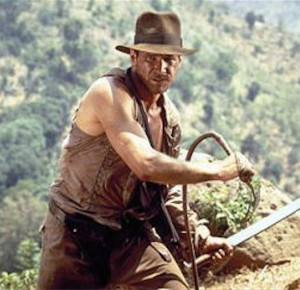Sperm Archaeology
Isn’t all of archaeology just like this? (Courtesy: Collider.com) “I heard that you can get sperm from a rock,” said the patient. Eyebrows raised, I responded: “Actually, I’ve never tried.” But his statement did get me thinking: I am a sperm archaeologist of sorts. Sands of Time Growing up, who hasn’t thought about being an archeologist at some point? Sifting through sand in exotic places, looking for clues, finding fossils and artifacts and generating grand new ideas about who we are and from whence we came. Buried Sperm Is helping men with azoospermia have children anything like this? I think so. See if you agree: We both study human culture, but I also “culture humans” by finding sperm that leads to more little


Isn’t all of archaeology just like this? (Courtesy: Collider.com)
“I heard that you can get sperm from a rock,” said the patient. Eyebrows raised, I responded: “Actually, I’ve never tried.” But his statement did get me thinking: I am a sperm archaeologist of sorts.
Sands of Time
Growing up, who hasn’t thought about being an archeologist at some point? Sifting through sand in exotic places, looking for clues, finding fossils and artifacts and generating grand new ideas about who we are and from whence we came.
Buried Sperm
Is helping men with azoospermia have children anything like this? I think so. See if you agree:
- We both study human culture, but I also “culture humans” by finding sperm that leads to more little boys and girls.
- We are both obsessed by the past. Archaeologists take a long, prehistoric look at antiquity, but I have a much shorter look back, concentrating on post pubertal events in life.
- We both investigate a myriad of clues to try to find out what happened in the past. Medical records and prior sperm retrievals (what kind? by whom? and when?) are two “fossils” that I routinely mull over. In terms of material learning, I view a testis biopsy the way archaeologists see the remains of an ancient campfire.
- We both agree that “context” is everything. What you find and where you find it matters a whole bunch. As I always say: ”where there are spermatids, there are usually sperm.”
- We both go on “digs.” Once the planning is complete and the patient prepared and everything optimized, the hard work of the search begins. And this my friends, is all about sheer effort.
- We both try to preserve what we find on digs. Although the term “excavation” could be applied to some sperm retrieval approaches used today, I see FNA sperm mapping as a much more strategic and less disruptive way to find and preserve things of value.
- We both observe, record and interpret what we find. Common training in the scientific method allows us to keep pushing the limits of our fields.
Most importantly, we both seek to find things of great value to others and by doing so enrich the lives of many, including our own. And, as far as I can tell, the biggest difference is that archaeology brings yesterday’s stories into today’s lives, whereas I tend to bring tomorrow’s stories into today’s lives.
The post Sperm Archaeology appeared first on The Turek Clinic.
SOURCE: The Turek Clinic – Read entire story here.







